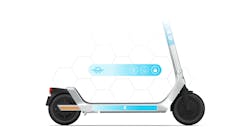Bird Global, Inc. (Bird) has released new details about its battery management system (BMS) which helps power millions of micro-EV trips globally.
The company is improving micro-EV battery safety and technology by designing and implementing IP68-rated lithium-ion battery cell packs in its latest vehicles. Bird says IP68 is the industry’s highest rating for protection against damage from dust and liquids such as water.
“Innovation and safety are at the core of everything we develop at Bird. In this case, it’s innovating on the products and systems that provide everyone – from riders to city partners – with the best vehicles and experiences,” said Bird Chief Vehicle Officer Scott Rushforth. “Our state-of-the-art battery management system provides real-time monitoring and feedback to help ensure our vehicles remain ready to get riders from point A to B and reduce reliance on gas-powered car trips.”
Bird’s BMS was designed, engineered and tested by the company's in-house team of automotive and battery specialists. These innovations, paired with components from top tier suppliers such as LG and Panasonic, undergo extensive testing in Bird’s research and development center. The simulations, which span events that impact batteries including extreme temperatures, humidity and vibrations, aim to help increase battery longevity and safety regardless of external conditions.
The BMS is designed to mitigate failure modes, common with lithium-ion batteries and to help keep riders and communities safe. The system features all of the functionality of a BMS found in full-size electric cars including cell monitoring, reporting, rebalancing and anomaly detection.
Bird BMS also provides:
- Real-time diagnostics that measure battery conditions like humidity levels and temperature to avoid pushing cells beyond their rated capacity. If abnormalities are detected, Bird’s operations team is notified so they can immediately remove the vehicle from public use.
- Dynamic battery power limits to maintain safety and performance regardless of changing conditions such as extreme temperatures or areas with inclines or declines. The BMS enables adjustments to such conditions in real time by continuously calculating the maximum allowable charge and discharge based on temperature, voltage and other sensor parameters.
- Effective communication and data capture that enables Bird’s operations and engineering teams to analyze historical statistics as well as monitor diagnostics and performance across large fleets of vehicles. These inputs help identify potential issues and inform future battery and vehicle innovations and advancements.

